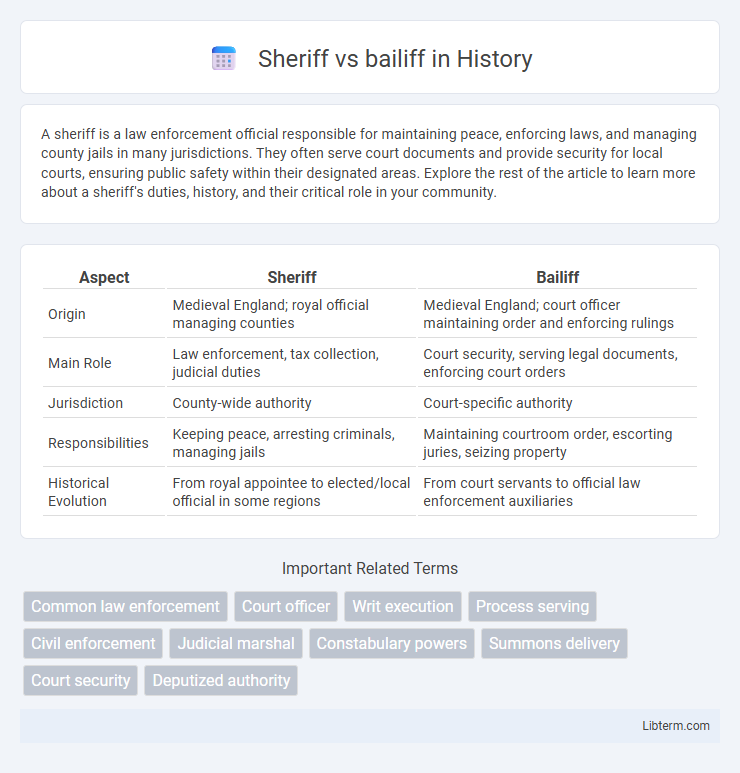A sheriff is a law enforcement official responsible for maintaining peace, enforcing laws, and managing county jails in many jurisdictions. They often serve court documents and provide security for local courts, ensuring public safety within their designated areas. Explore the rest of the article to learn more about a sheriff's duties, history, and their critical role in your community.
Table of Comparison
| Aspect | Sheriff | Bailiff |
|---|---|---|
| Origin | Medieval England; royal official managing counties | Medieval England; court officer maintaining order and enforcing rulings |
| Main Role | Law enforcement, tax collection, judicial duties | Court security, serving legal documents, enforcing court orders |
| Jurisdiction | County-wide authority | Court-specific authority |
| Responsibilities | Keeping peace, arresting criminals, managing jails | Maintaining courtroom order, escorting juries, seizing property |
| Historical Evolution | From royal appointee to elected/local official in some regions | From court servants to official law enforcement auxiliaries |
Overview: Sheriff vs Bailiff
Sheriffs are elected law enforcement officers responsible for maintaining public safety, executing court orders, and managing jail operations, primarily in counties or larger jurisdictions. Bailiffs serve as court officers tasked with maintaining courtroom security, ensuring order during proceedings, and assisting judges and jurors within the judicial environment. The primary distinction lies in the sheriff's broader law enforcement duties compared to the bailiff's specialized focus on courtroom security and administration.
Definition and Role of a Sheriff
A sheriff is a legally elected or appointed official responsible for maintaining law and order within a county, overseeing the enforcement of court orders, and managing county jails. Unlike a bailiff, whose primary role is to maintain courtroom security and assist judges during court proceedings, a sheriff has broader authority that includes patrolling, investigating crimes, and serving warrants. The sheriff's duties often extend to civil process services and ensuring public safety across the jurisdiction.
Definition and Role of a Bailiff
A bailiff is a court officer responsible for maintaining order during court proceedings, ensuring the security of the courtroom, and assisting the judge with administrative tasks. Unlike sheriffs, who enforce laws and handle broader law enforcement duties, bailiffs focus primarily on courtroom management and the execution of court orders such as summoning jurors and serving legal documents. Their role includes escorting defendants, managing evidence, and facilitating communication between the judge and courtroom participants to ensure smooth judicial operations.
Key Responsibilities of Sheriffs
Sheriffs are typically responsible for enforcing court orders, managing county jails, overseeing prisoner transport, and providing security for courtrooms. They also execute warrants, serve legal documents, and may assist in civil processes such as evictions and property repossession. In contrast, bailiffs primarily maintain order within the courtroom, protect judges, and ensure the safety of all participants during trials.
Key Duties of Bailiffs
Bailiffs are responsible for maintaining order in courtrooms, delivering legal documents such as summonses, and enforcing court orders like property seizures or evictions. They ensure the security of court premises, assist judges during trials by managing juries and witnesses, and execute writs issued by the court. Unlike sheriffs, bailiffs primarily function within the judicial environment, focusing on procedural and administrative enforcement duties.
Jurisdiction and Authority Differences
Sheriffs hold broader jurisdictional authority, often elected county officials responsible for law enforcement, court security, and managing county jails, with powers extending across entire counties or regions. Bailiffs serve primarily within specific courts, providing security, managing order during proceedings, and executing court orders under the direction of judges, with authority limited to the courthouse environment. The sheriff's authority encompasses law enforcement and civil processes countywide, while bailiffs operate under judicial authority focused on courtroom enforcement.
Training and Qualifications Required
Sheriffs typically complete law enforcement training at a police academy and must meet state certification standards, including physical fitness, firearms proficiency, and legal knowledge. Bailiffs usually receive specific court security training after acting as law enforcement officers or court employees, focusing on courtroom procedures and conflict resolution. Both roles demand ongoing education to maintain certifications and effectively manage their distinct responsibilities in law enforcement and court security.
Employment Settings: Where They Work
Sheriffs primarily work in county law enforcement agencies, overseeing deputies who perform policing duties including managing county jails and serving legal processes. Bailiffs are typically employed by local, state, or federal courts, where they ensure courtroom security and assist judges in maintaining order during legal proceedings. Employment settings for sheriffs are more diverse, spanning various law enforcement responsibilities, while bailiffs are specialized court officers focused on judicial environments.
Career Path and Advancement Opportunities
Sheriffs often begin their careers through law enforcement roles such as deputy sheriff, with advancement opportunities to elected sheriff positions offering leadership and administrative responsibilities. Bailiffs typically start as court security officers or deputies, advancing through experience and training to supervisory or administrative roles within the judicial system. Both careers benefit from specialized training programs, with sheriffs having broader law enforcement authority, leading to diverse advancement possibilities.
Sheriff vs Bailiff: Which Is Right for You?
Choosing between a sheriff and a bailiff depends on your specific legal needs and jurisdiction. Sheriffs typically oversee law enforcement duties within a county, including managing jails and serving court papers, while bailiffs focus on courtroom security and maintaining order during trials. Understanding the distinct roles of sheriffs and bailiffs ensures you select the right authority for effective legal enforcement and security.
Sheriff Infographic

 libterm.com
libterm.com